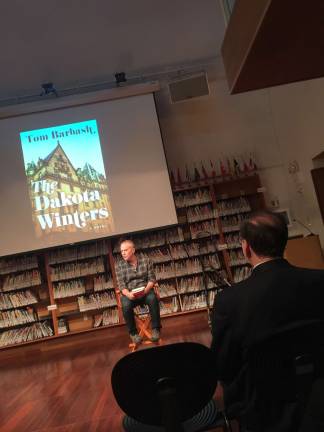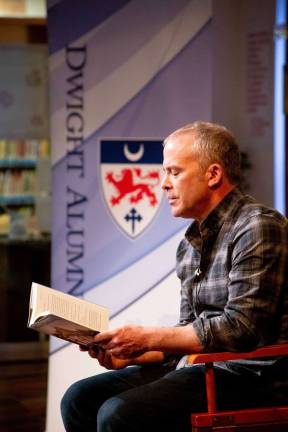An author and his alma mater


By Jon Friedman
The acclaimed writer Tom Barbash had just finished giving a well-received reading from his new novel, “The Dakota Winters,” at his alma mater, the Dwight School on the Upper West Side of Manhattan.
Barbash’s story line hooked me instantly since John Lennon, my favorite rock and roll star of all time, looms as a major presence in the book (which is published by Harper Collins). As Barbash was accepting congratulations and signing books, I felt compelled to lean in and ask him what his favorite Lennon song was.
He shot back, “Beautiful Boy,” one of John’s signature compositions on Lennon and Yoko Ono’s highly entertaining 1980 collaborative comeback album, “Double Fantasy.”
“Beautiful Boy” resonates with me because it contains one of Lennon’s indelible lines/philosophies: Life is what happens to you while you’re busy making other plans.
For Barbash, Lennon’s pearl is a way of life.
He never imagined becoming a writer, much less a distinguished and much-admired one. Barbash went to college at Haverford in Pennsylvania, expecting to become a lawyer. But he gravitated to the writing life, first as a reporter on the Syracuse Post-Standard, where he said he learned to respect deadlines and “not to be too precious” with his words. Then he progressed to writing long-form projects. Barbash is also the author of the novel “The Last Good Chance,” a collection of short stories, “Stay Up With Me,” and the nonfiction work “On Top of the World: Cantor Fitzgerald, Howard Lutnick & 9/11: A Story of Loss & Renewal.”
Barbash’s latest work takes place around 1979 and centers on the Winters, a family living in Manhattan’s celebrated Dakota apartment building in the year leading up to Lennon’s assassination on Dec. 8, 1980. To give you some perspective, this month we are marking the 39th “anniversary” of this still mind-blowing event.
When Lennon lived in the Dakota — he and his wife Yoko Ono moved in around 1972 and John called it home till he was assassinated — he was practically the real mayor of New York. Fans and tourists made pilgrimages to the Dakota in the hope of getting a glimpse of him. Me, too. I used to loiter at Lennon’s favorite neighborhood hangout, Café La Fortuna, in the hope of, oh yes, getting a glimpse of him.
(I was determined to ask him if the walrus really was Paul. KIDDING!)
For Barbash, as with skilled novelists everywhere, the setting of his story is like another major character.
“I had to create a world,” Barbash told his Dwight audience, referring to what was then a very different Manhattan — one that seemed more adventurous and daring than the one featuring a maze of such 21st-century chains and staples as, well, Staples/Starbucks/Sunglass Hut/Whole Foods/Trader Joe’s and any number of antiseptic bank chains as far as the eye can see.
“It was a more dangerous place back then,” Barbash acknowledged, adding slyly: “We miss it.”
The reading gave Barbash an opportunity to return to his roots at Dwight, one of the city’s notable private schools, and, especially, reacquaint himself with the remarkable Stephen Spahn.
If Barbash may feel compelled now and then to shake his head in surprise at his career path, one person who professes not to be shocked is Spahn. He has been the highly effective chancellor of Dwight for an astonishing five decades. In fact, as a testament to Spahn’s success, this congenial and deeply analytical educator serves as the longest-serving head of a school in the United States.
Following the reading, Spahn recalled that Barbash exhibited the kind of passion that great writers need to have — though his student at the time most vividly expressed himself on the tennis court. Fiery and emotional, Barbash made a lasting impression on Spahn, whose great skill as an educator is to create an environment that can help to bring out the best in his charges.
“He was intense,” Spahn recalled with a smile, noting that Barbash had to learn “how to channel” his emotions through his writing. “He had a huge emotional intensity.”
This admiration society is clearly a mutual one. Barbash unabashedly refers to his mentor as “Chancellor Spahn,” though Barbash left Dwight decades ago. He says that Spahn has been a “huge person in my life.” Barbash, who now teaches novel writing, short fiction and nonfiction at the California College of the Arts, surely can appreciate the impact that dedicated teachers can have on students. Not coincidentally, perhaps, the mantra of Dwight School, which has six global campuses, is “igniting the spark of genius in every child.”
I took the time to look around the room while Barbash gave his reading. The audience consisted largely of Dwight teachers, students and alumni. The 70 of us were hanging on Barbash’s every word and during the subsequent Q&A session, admirers asked him detailed, nuanced questions, signs that they had really listened to him.
Ultimately, it was the best of times: a triumphant occasion for a beloved writer — and his beloved alma mater.